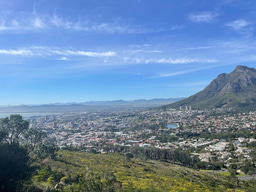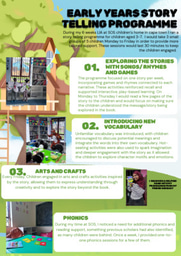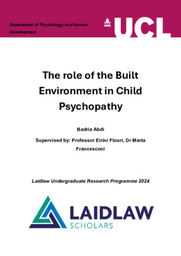Laidlaw: Personal reflections
When I submitted my application to become a Laidlaw Scholar, I could not have anticipated the extent to which this program would transform my perspective or the doors it would open. Upon reflection, I am astounded by the extraordinary nature of this journey, not only in terms of the opportunities it has presented, but also in the individuals I have met and the experiences that have profoundly altered my perspective on the world.
Every step of this program has provided me with invaluable experiences. From my initial summer of research on child psychology, to the Laidlaw conference in Leeds, to my time working at a children's home in South Africa during my LIA, I have been presented with opportunities that I never imagined were possible. I had the opportunity to interact with distinguished researchers, work directly with children who are confronted with unimaginable challenges, investigate a country and culture that are vastly different from my own, and make a meaningful contribution to communities that required assistance.
However, it is the individuals who have truly distinguished this program. I have encountered scholars from a variety of backgrounds, whose passions and perspectives have both challenged and inspired me. Each person I met, whether fellow scholars or the children I worked with, taught me something profound about what it means to be an ethical leader and a global citizen.
My experience working with children who had experienced trauma during my LIA demonstrated to me that their outbursts were not simply the result of poor behaviour; rather, they were reactions to events that the majority of us would be unable to imagine surviving. I immediately came to the realisation that leadership did not consist of being in charge; rather, it consisted of creating space and giving the children time to process their emotions. Throughout this programme, I learnt that there are times when the smartest thing is to step back and be patient.
After I had taken the time to comprehend the experiences that each child had gone through, I was able to meet them where they truly were, rather than where I assumed that they should be. I learnt that real leadership is about developing spaces where people feel comfortable enough to trust and thrive.
Working with these children also confronted me with my own privilege in ways I hadn't expected. The things I'd always taken for granted, good schools, the ability to dream freely, countless opportunities, suddenly felt enormous when I saw kids showing incredible strength despite having almost nothing. Watching them hold onto hope and imagine better futures despite everything humbled me deeply. It made me understand that being a global citizen isn't just about appreciating other cultures, it's about recognizing inequality, developing genuine empathy, and actually doing something to help communities wherever we can.
Being a good global citizen isn't about big grand gestures. Instead, it could be about something as small as showing appreciation for cultures beyond mine. It is about respecting perspectives that differ from your own, recognising the ways in which we are all interconnected, and utilising any advantages you possess in order to assist others. It involves always learning from the things you experience and from people whose lives are different from yours.
The most significant lessons that I am taking forward with me as a leader are to always have patience, contextual knowledge, and lead with empathy. Working with children, particularly those who are in dire need of an advocate, it is crucial to create circumstances in which they feel that they have enough support. Good leaders know when to step back, have the courage to examine their own impact honestly, and fight for fairness and justice even when it's uncomfortable.
This experience allowed me to gain a completely new perspective on what it means to be an ethical leader. Most importantly, it showed me that empathy, resilience, and accountability are how we actually build something better. When you truly engage with people and their struggles, you don't just help them grow. You grow too




Please sign in
If you are a registered user on Laidlaw Scholars Network, please sign in